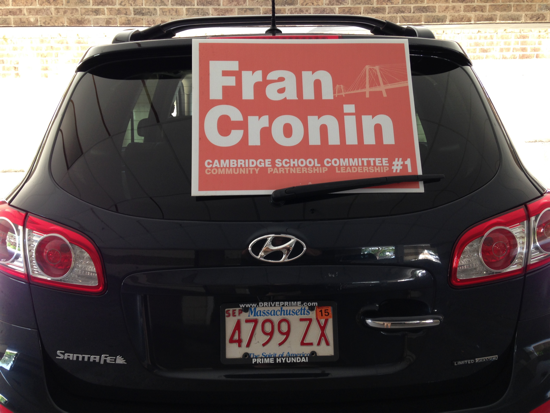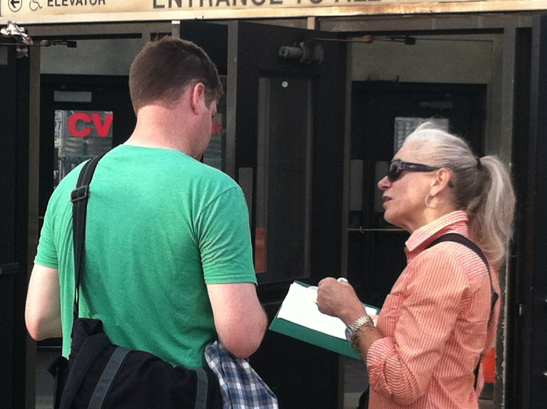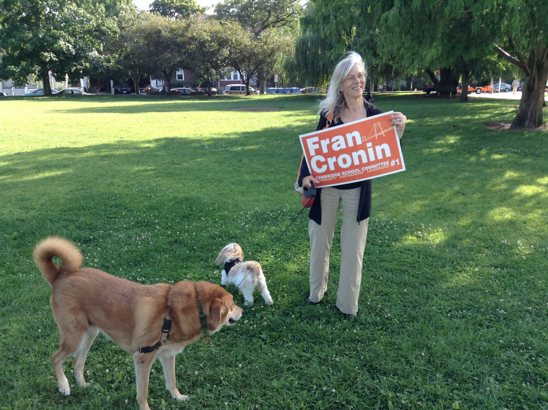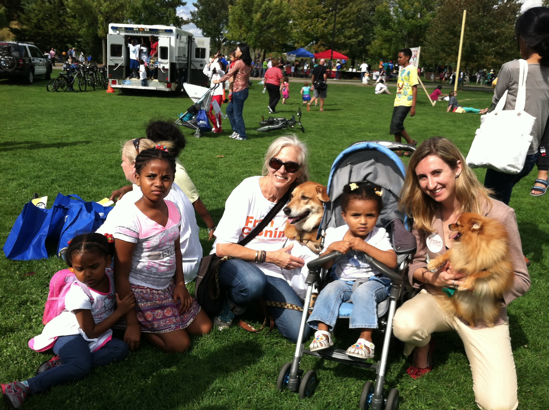Essay by Fran Cronin
A Candidate’s Not-So-Secret Book Addiction

The only thing I knew at the outset of the campaign was that I wanted to have my friends when it was all over. The rest was up for grabs.
By the end of October 2013, closing in on Election Day in Cambridge, Massachusetts, summer’s heat had been replaced by heat from the campaign. We nine candidates for the six-member Cambridge School Committee had stood our ground through public forums, interviews, podcasts, and endless days of door knocking.
I was bullied, called a liar, and subjected to juvenile, low-blow slandering that called into question the personal decisions I’d made regarding my own children’s education. My support team huddled with consternation over these attacks, as if they were behind-the-scenes theater hands scheming to avert disaster.
Driving around in my increasingly dingy portable office (otherwise known as my car), I turned to listening to books on CDs as a refuge from pavement pounding. During the summer, as I blithely floated into my new role as “Candidate Cronin,” Gillian Flynn’s 2012 blockbuster Gone Girl became my soundtrack. By fall, the momentum of the campaign had me immersed in House of Meetings, Martin Amis’s 2007 novel about the Soviet Union’s gulags. In the weeks right before the November election, I was deep diving into the wisdom of Sonia Sotomayor’s 2013 memoir My Beloved World.
I began listening to these books as naively as I’d begun my campaign: Press the start button and go. But as the physical demands and psychological dimensions of campaigning began to erode my veneer of confidence, my need to stay emotionally connected to the books—and myself—increased. It was more than just a throwaway activity or diversion. I was listening hard, aware of how the challenges faced by these protagonists ran parallel to my own. To quote Justice Sotomayor:
Sometimes, idealistic people are put off the whole business of networking as something tainted by flattery and the pursuit of selfish advantage. But to succeed in this world you have to be known to people.
Win or lose, I did what I needed to do—and books helped me plumb the depths of what was going on in my head.

Floating: Summer 2013
My daughter had just graduated from our public high school, but it was my son who really kick-started my school advocacy. For years, I’d experienced firsthand how limited the school system was in dealing with his special needs and supporting me as his sole parent. In 2010, I became a co-chair of the Cambridge Parent Advisory Council for children with special needs. Three years later, I was running for a School Committee seat to help oversee our district’s diverse, 6,000-plus student body.
Late in July, my campaign launched on a sultry night with heavy showers. I worried about my hair—a lot. Orange balloons hung from tall bare poles; signs had been taped to large glass windows to locate our event; passersby stopped to peer in at us in the Middlesex Lounge, a street-level performance space in Cambridge’s Central Square. The way I’d practiced my speech you’d think I was going to deliver a Shakespearian soliloquy.
Turned out to be a good night, the kind of send-off fifty loved ones give a foolish adventurer: “Best of luck. Go get ‘em!” In truth, the last time I’d run for elected office was in high school.
Campaigns are like musical theater, chock-a-block with little production numbers: slogans, photo ops, endorsements, newsletters, glad-handing, house parties, and fundraising events. That’s the visual. In reality, it’s a numbers game. How many people can you get to vote for you, and where will those votes come from?
Noah Coolidge, my chief strategist—brilliant, barely twenty, and a giddy numbers cruncher—had a head full of a knowledge that could only be revealed on paper. At the outset, he gave me one hard-core directive: “Knock on doors. It’s the only way you’ll make your numbers.” Jess Lander, my regimented and exacting Obama-trained field organizer, pushed me even harder.
“I can’t do sixty doors in two hours!” I cried. “I’m the candidate. People want to talk to me.”
Jess listened with little patience. The turf routes kept coming; the number of doors kept going up. Jess and Noah said knocking on 75 a day would be a “piece of cake.”
So began my journey through Cambridge’s eleven electoral wards, spanning the city’s lushly landscaped neighborhoods to boxy brick city housing. As a political unknown in a city of more than 100,000 people, we plastered the neighborhoods with my vivid orange lawn signs: Fran Cronin emblazoned beside an iconic bridge.
I shook hands with baby boomers, young tech professionals, seniors, and Cantabrigians whose families had lived in the city for generations. I met bible thumpers and atheists, civic supporters and cynics. I listened to family stories; anxieties; bold ideas; personal gripes; complaints about the renaming, opening, and closing of beloved schools. I brought letters down to City Hall to get absentee ballots for old ladies unable to get to the polls.
During August’s shimmering waves of heat, the sun would set, and I wouldn’t be close to making my numbers. But every day brought the same email from Noah:
More doors.
I knocked and shook hands until the sweat stung my eyes and my feet swelled out of my shoes. Then I’d get in my car, crank up the AC, and hit the CD play button.
Sealed in my cool car with the engine humming, I’d drift back into the he-said-she-said melodrama of Gone Girl. A popular beach read that summer, it also offered edgy hints about the way public personas can be manipulated. All I wanted was mental relief, but sometimes author Gillian Flynn’s words cut uncomfortably close. As her main female character, Amy Dunne, puts it:
It’s a very difficult era in which to be a person, just a real, actual person, instead of a collection of personality traits selected from an endless Automat of characters.
Flynn’s message seemed prescient as I wrestled with crafting my own public persona. Like the competing stories created by Amy and her husband Nick, I had to create a new “me.” 
Immersion: Fall 2013
The last Wednesday in September was the evening of our first city-wide candidate’s forum. Like the ominous outdoor weather, a cloud hung over my head. All was about to be lost. I would soon publicly reveal my complete ignorance.
Held in the cavernous gym of Fletcher Maynard Academy, one of Cambridge’s twelve elementary schools, the forum’s focus was on children of color. I came armed with anecdotes, full of righteousness and the stats I’d read. But my kids had never gone to this school; I didn’t know these families, and they didn’t know me. I felt mildly consoled by the bottle of water placed on the table for me. I was dismayed when I saw the microphone.
The incumbents were in their element—gesticulating and espousing about the things candidates seeking reelection like to gesticulate and espouse about: Social justice! The inequity of access! The persistence of our achievement gap!
I waited my turn to speak, then dutifully stood to face the rows of folding chairs occupied in clusters by people with expressionless faces. A few friends smiled or gave me a thumbs up.
“Ms. Cronin, will you please tell us your thoughts about dual immersion?” asked the moderator.
I thought of kids buddying up with a friend as they were dunked under water; I thought of double dipping. A rite of passage? No. Dual immersion is the term used to describe dual instruction in a native language (English) and a “world language” (such as Spanish, Portuguese, or Mandarin), but I felt immersed in my own idiocy. I ended my response with a definitive “We can do better” and sat down with no recall of what had come out of my mouth.
From the corner of my eye, I caught a wink from a seasoned pol. And for the remainder of the evening, I addressed the audience, feeling out-of-body, as if another person were mouthing my remarks. My closing statement was remarkable for its coherence. Later that evening, someone tweeted about my “insightful” discussion of dual immersion. Ha!
During my daily car rounds that week, I’d been listening to Martin Amis’ s House of Meetings. Amis interested me as an author, but this novel was a random choice from the shelves of my local library. Still, it didn’t take long for his story about surviving the Soviet gulags to infiltrate what was rapidly becoming my scripted routine.
Like Amis’s characters, I was driven by the need for self-preservation. I wallowed in the intended and unintentional effect of my words; I parsed shards of meaning from the tactics of my competitors. Everything around me felt rife with portent. And like his characters, I began to question my own motives and the integrity of my ambition. Where was my moral compass set? What made me think I had what it took to get elected, let alone to lead? I no longer took anything for granted. As Amis writes:
When you’ve lost all your play, guess what love becomes. Work. Work that gets harder every hour.
By the end of October, a week before the election, I was knocking on over a hundred doors a day. I kept hearing I don’t vote or nothing’s going to change or I’ve already made up my mind or why do you think you’re going to be different?
One afternoon, a distinguished-looking man welcomed me into his home.
“Why do you say you’re a ‘widowed single mom’?” he asked, scanning my literature.
“Because I am,” I said.
“Why not just single mom?”
“Because there’s more to my story.”
His tone quickly became belligerent, accusing me of falsifying his truths. Rather than argue, I excused myself, biting back my anger. I preferred having a door slammed in my face than being accused of not knowing who I was.

Deep Dive: Election Day
My sleep was anything but restful. Rising from my bed on November 5, 2013, was like trying to surface in a murky pool. I felt as flat as an airless inner tube. I blinked at the morning light as it sliced through my wooden blinds. Show time.
After one discouraging look in the mirror, I pulled my hair back into a ponytail and futilely dabbed on makeup to conceal my puffy eyes and the deep lines that cut diagonally from nose to mouth. My arm throbbed; a pain had been radiating down the length of it for weeks. I took small comfort in the signature orange scarf I wrapped around my neck.
The polls opened at 7 a.m. One of the first to arrive at my neighborhood school’s polling station, I cast a vote for myself and my potential slate of five other colleagues. Outside, I greeted supporters with one-armed hugs and acknowledged with a nod those who appeared more neutral or were clearly supporting other candidates. I followed Jess’s orders, moving myself and my seven-foot-tall sign to one of the other 34 polling stations across the city.
Mid-afternoon, bone-weary, I dragged myself home for a nap. By 3:30 p.m., I was asleep with a blanket over my head. When I woke up an hour later, beating back my nagging sense of dread, I knew there was nothing more to be done.
I’d just finished listening to Sonia Sotomayor’s My Beloved World, a memoir radiant with the Supreme Court justice’s grounded intellect and wisdom. Her clear-eyed perspective on what drove her ambition, her rock-solid belief in the good of civic engagement, had resonated with me. Sotomayor’s words were now my ballast:
As you discover what strength you can draw from your community in this world from which it stands apart, look outward as well as inward. Build bridges instead of walls.
Her life experiences spoke to what I knew to be true about myself: I was not a cynic. As foolish as it seems, I knew that I believed in what I said and what I stood for. By 5:30 p.m., I was back at my neighborhood polling station, acknowledging well-wishers, chatting with friends, and trying to convey a winner’s stance. I stayed at my post, holding my sign, until the polls closed at 7 p.m.
That night, surrounded by friends, laughing, telling stories, eating the food and drinking the wine they’d brought, we fielded text updates from other friends stationed at the senior center where the results were being tallied. The TV—audio off—was tuned to the city’s closed-circuit channel.
At 11:30 p.m., the results were in. Like a pop-up whoosh, I was in the midst of a massive group hug, all of us screaming and laughing and, yes, crying.
I had won—and I still had my friends.
Publishing Information
- Gone Girl by Gillian Flynn (Crown/Random House, 2012).
- House of Meetings by Martin Amis (Knopf, 2007).
- My Beloved World by Sonia Sotomayor (Random House, 2013).
Art Information
- "Fran's Car" "Campaign Trail," "Dog Days," and "Cambridge Park" © Fran Cronin; used with permission.
 Fran Cronin is a contributing writer at Talking Writing. On January 6, 2014, she was inaugurated as a member of the Cambridge School Committee, beginning her two-year term.
Fran Cronin is a contributing writer at Talking Writing. On January 6, 2014, she was inaugurated as a member of the Cambridge School Committee, beginning her two-year term.
Having just completed The Round House by Louise Erdrich, Fran is currently reading Vicki Constantine Croke’s Elephant Company, about a different type of campaign.
